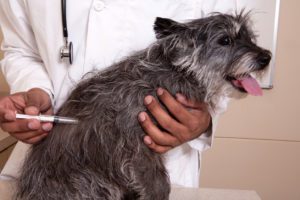
Our Veterinary Blog
Why is the Dog Rabies Vaccine Important?
Rabies is a tragic and lethal disease that can be avoided by having your dog immunized against it. Your dog is an integral component of your family, and you do not want to lose them to this virus.
The rabies vaccine is the best, most effective way we can safeguard our pets from contracting rabies. It will protect your pup, other animals, and your family from a fatal outcome. It is legally required that your dog gets their rabies vaccination and booster shots.
Pet parents want their dogs to live a happy and healthy full life. Read more to find out why the dog rabies vaccine is essential.

What is Rabies?
Rabies is a preventable contagious disease that causes abrupt and progressive brain and spinal cord inflammation. The bite of an infected animal can facilitate the spread of rabies. It is usually only seen in wildlife due to strict vaccination protocol that requires us to vaccinate our pets. Some of the wildlife that can have rabies are:
- Raccoons
- Skunks
- Foxes
- Coyote
- Bats
Dogs can also contract rabies if the diseased animal’s saliva comes in contact with a scratch or an open wound. Keep your dog away from wildlife. The good news is that since most dogs in the United States are vaccinated against rabies, the likelihood of them being infected by another dog is rather slim.
What Are the Symptoms of Rabies?
The symptoms of rabies typically occur about three to seven weeks after the virus enters the dog’s body. There are different symptoms for each stage. However, there are some common signs that a dog may have rabies. Here are the symptoms:
- Hiding
- Vomiting
- Exhaustion
- Lack of appetite
- Difficulty breathing
- Hypersalivation
- Foaming at the mouth
- Behavioral changes
- Sensitivity to light
The early symptoms are often difficult to detect. The dog may also have a fever in addition to the above symptoms.
What are the Advanced Symptoms of Rabies?
The later stages of rabies are more identifiable. The advanced symptoms are:
- Aggression
- Hallucinations
- Inappropriate behavior
- Attacking people
- Biting things
- Seizures
- Rapid deterioration
- Paralysis
Once paralysis begins, the dog no longer shows aggression, but they are often lying down and breathing heavily. The final stage of rabies ends with a fatal outcome.
What Are the Phases of Rabies in Dogs?
There are various stages of rabies in dogs, and these stages have names. Rabies progresses rather quickly, and it is difficult to tell which stage of the disease the dog is in, but there are some ways to distinguish between them.
Incubation Period
This stage refers to the time of the bite until the appearance of the early stages of symptoms. During this time, the dog will not necessarily demonstrate signs. This phase can last from a week to several months.
Prodromal Stage
The dog will display symptoms such as fear and isolation. They may also be nervous and not act like themselves. This period can last from two to ten days.
Aggressiveness Stage
This phase is the typical picture of what rabies does to an animal. The dog becomes irritable and may bite their family. This stage is very high risk and dangerous.
Paralysis Stage
In the final stages of rabies, the dog will become paralyzed and may go into convulsions. Eventually, they will lapse into a coma. Ultimately, death occurs.
Why is the Dog Rabies Vaccine Important?
The rabies vaccine has nearly stopped the spread of rabies among domestic dogs. Around 60 to 70 dogs and 250 cats are reported rabid yearly. Most of these animals were not vaccinated and became infected with rabies from wildlife.
Rabies is a zoonotic infection and can be spread from animals to people. When you protect dogs with the rabies vaccine, you also protect people. In virtually every case, the infected animal dies when they contract rabies. The rabies vaccine is of the utmost importance.
There have only been a few documented cases in which dogs have survived rabies. It has been suggested that those few survivors were bit by an animal with a meager amount of the rabies virus in their saliva, which decreased the amount of rabies contracted by the dog.
Unfortunately, in most cases, the infected animal is put down to protect humans and other animals. This is why your dog needs the rabies vaccine. You do not want to confront the grim reality of your dog contracting rabies.
If your dog comes in contact with a potentially rabid animal, your veterinarian will probably give your pup a booster shot, even if they are up to date with their vaccines. It is necessary to protect your dog, other animals, and people. The rabies vaccine is the best way to protect your pets against rabies.
Even in this country, where the occurrence of the disease is infrequent, we all need to do our part to prevent rabies from killing our canine companions, furry felines, and the people we love.
What Happens When a Dog is Quarantined for Rabies?
An unvaccinated animal suspected of carrying rabies that is not put down is subjected to strict quarantine. The quarantine will last for four to six months when the dog will be kept away from other animals and humans. If symptoms do not develop at some point in this time, the dog will not likely have rabies.
What is the Rabies Vaccine Program for Dogs?
It is mandated by law that dogs, cats, and ferrets, get the rabies vaccine. There are different rules for various states. You must determine what your state legally requires concerning the rabies vaccine. You can discuss the proper protocol with your veterinarian or contact your local health department.
Most states require that dogs be vaccinated when they are around three months old. They should be given a second shot according to the product label directions. The booster shot is given one year again after the first vaccine. Then, they are given again once a year or every three years. It varies on the state regulations and the particular vaccine used.
Conclusion
The rabies vaccine is essential for your dog, as you do not want to lose your beloved fur baby to the disease. If you see any symptoms of rabies mentioned in this article, you need to get your dog to the vet immediately.
If you’re in the Lakeland, FL area and have questions about the rabies vaccines or would like to schedule an appointment with one of our skilled doctors, call us at (863) 688-3338. We are here to answer any questions you may have.
Recent Posts
About Us
Family is family, whether it has two legs or four. At Lakeland Animal Clinic, we've spent the last 40 years healing and caring for your pets. As a family-operated practice, we know that family is about more than simply being related. Animals give us the ability to develop strong bonds and feel great compassion for a fellow living creature.
